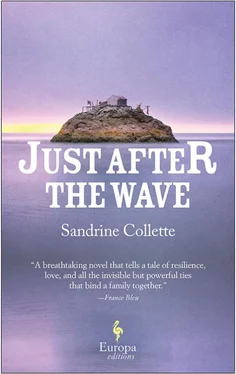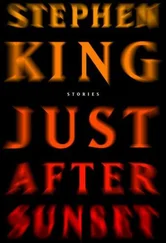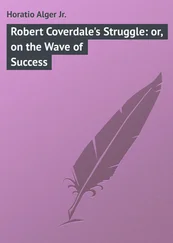Next to her the boys walk like old men, broken and silent. They are thinking of their basket swallowed by the storm, with four, almost five, fish. And it was pointless for the sea to reclaim them, because they’d already killed them, their father had taught them never to let animals suffer, suffocating in the air, and they had done everything as they should—and look what happened. No more basket, no more fish. No more fishing poles, they too went out with the wave, they were surely snapped in two by the wind and the water; and it’s not with a branch of hazel bush and a length of yarn, the way their father used to keep Noah happy, that they’ll be able to catch anything.
“We could try anyway,” whispers Noah.
It annoys Louie when Noah spouts nonsense, he knows very well they don’t even have any more hooks. What, they’ll just ask the fish to bite the yarn as a gesture of goodwill? Noah hangs his head. It might work.
“Yeah, sure,” says Louie.
They change into dry clothes, they’re still shivering. Perrine has taken the eggs, broken three of them and beaten them with sugar to add to the pan with a pancake. In another saucepan she is heating the milk and a few squares of chocolate, and she orders Noah to stir it slowly. The time it takes to put on a sweater and it already smells of pancakes browning. Their mouths are watering, eyes shining. Eating reconciles them with each other, relaxes them: they talk about the storm, exaggerating slightly, laughing at their bruises and their luck. Not once do they wonder if the sea is about to rise again soon. They look outside, the waves are still rough, the wind is hurling rain through the windows, it makes them jump every time, their hands held up against the gusts of air. Divided between a cozy sentiment of sheltered safety and the fear that a gust will blow the entire house away, they chatter, interrupt each other, go on chattering. The storm worries them, even though its strength is waning; they clench their teeth in silence, listening out for the sound of water and wind and hoping it will all go away. An hour later the sea is almost calm, still they watch, the sea and the detritus it has washed up from the dark depths, bits of wood afloat for months or years and which the underwater eddies have restored to the surface, scattered flotsam drifting on the surface, like dead fish.
The sea is calm and there they are, the three of them, with a strange pain in their chests, on the upper left-hand side. They rub it in vain with the palms of their hands to make it go away, a pain as if they’d been jabbed with a needle and something was pressing it, a sting, an itching, discomfort. Then they know that something else has happened that they don’t understand, elsewhere, differently, but which their skin and their guts can sense through this unpleasant tingling, and this something is bound to be bad, they can tell from the impression of emptiness and want and fear that passes over them, they don’t speak of it, they gobble down the sweet pancake and lick their chocolate mustaches; it’ll go away eventually.
* * *
Eight. That is the number Louie sees on the step, the water licking regularly at the base of the chalk mark, as if it were scoffing at the closed doors, which are powerless to stop anything.
There is no trace of step number seven. Louie sits at the level of number nine, his gaze weary, his chin on his crossed arms. They must have lost eight inches since yesterday. He can’t remember his father ever telling them the water had risen that much. Outside, the hazel bush he and Noah had clung to during the storm now has its roots in the water; taking long strides, he measures. Two yards, maybe even three. If the sea keeps encroaching at this rate, in six or seven days even the roof of the house will be underwater.
So he decides: they have to get ready to leave. His feet wet when he comes in from the garden, he tells his siblings.
Leave? murmurs Perrine.
To go where? asks Noah.
To look for higher ground. The only real puzzle is, how?
How? echoes Perrine.
Yes, how? agrees Noah.
“We’ll build a boat.”
Noah laughs, all excited. Louie frowns because he has already thought of a way, and he really can tell Noah that there’s nothing funny about it at all, it’s no laughing matter, because there is nothing there to build a boat with.
What if they remove the shutters and doors? The wall of the woodshed?
Louie doesn’t know how a boat floats. And anyway none of them would know how to fashion the curves or put a vessel together: he’s thinking of a simple raft.
And if there’s a storm?
Shush. Shush. Don’t even mention it. There won’t be.
But if ever…
There won’t.
He erases the thoughts from his mind.
“So, we’re going to build a raft.”
Ah , say the younger ones.
“But if there’s a storm, will a raft sink?” asks Perrine.
Shush, shush. Don’t even mention it. There won’t be.
Louie looks elsewhere.
“We’ll try, okay?”
No questions.
“Okay,” says Noah, conciliatory. “What do we need to build it?”
And Louie doesn’t answer right away because he’s looking for the words, and they’re not at all satisfactory, words that won’t frighten them, that won’t show how little he knows about what they have to accomplish, how to reply truthfully, not only what first springs to mind and which he tries to translate into something reassuring, but also something besides the obvious fact that spins round and round in his head and keeps him from thinking: We need something that floats.
What do you mean, float?
Things that float, I said.
Louie looks at Noah, who looks at him. He articulates, to convince himself.
“We’ll find something.”
But who would have thought it could be this complicated, this impossible, on an island without electricity, without supplies, without adults to help or show them how? Louie has his face in his hands.
“Can’t you do it?” Noah just asked.
And he was tempted, he had to confess, even if his mother would have scolded because it’s not nice—but Madie isn’t there to give her opinion or give orders or decide what’s right or wrong—yes, Louie was tempted to slap his little brother, hard, and scream a terrible insult at him, something which would have brought him some relief, would helped him ease his nerves, allowed him to forget that he doesn’t know how to build a raft, and that, indeed, he can’t do it.
The simplest thing would be to take the door they’d used to build the watchtower. The door would be the raft. Besides, there was nothing else, no boards they could have put together, other than a few pieces of shipwrecked boat, nothing at all, and yet they did look, because that damned door weighed at least eighty pounds and they would need plenty of imagination to keep not only the door afloat, but also themselves as passengers; it would take a miracle.
So there it was, they had a door, but no floats.
What floats?
Madie always kept her empty plastic bottles. She said you could use them for all sorts of things—watering plants, making iced tea, or dye, you could turn one into a funnel if you cut it, pots for the children to fill with paint, five or six of them, with screams of joy. Empty plastic bottles: there used to be dozens, on shelves and in the barn.
A carpet of bottles strung together under the raft.
But the parents had taken most of the bottles with them; they had left only thirty or so to last until Pata’s return.
Empty out the bottles to turn them into floats, and they’d have no more water. It’s either or.
Читать дальше












